Sacrifice Netanyahu in Exchange for 2.4 Million Nakba Hostages and Hundred Israeli Hostages
Ground invasion into Gaza is immoral, illegal. It also shows Bibi has no action plan. Politics of vengeance doing nothing to actually protect Israeli citizens, especially those held hostage in Gaza
DC 5.35pm Oct 14 / Jerusalem - Gaza Strip - Tel Aviv 0.35pm Oct 15 [186 hours of war, still continue] BREAKING NEWS live update trilingual [hebrew - arabic - english] click here
When this note starts to typing, insane rainstorm on all the internally displaced people of Gaza. Very bad news and will certainly cause huge health risks. Still pouring down, will be an incredible health crisis for anyone without solid shelter. Which may be a million people or more. Israel's assault on Gaza should be understood as a textbook case of genocide unfolding in front of our eyes, global spotlight, whatever your religion.
As of 00am Sunday Oct 15 - local time now [time lapse 186-187 of war, or 5.35 pm Washington DC], death toll in Gaza alone already 2,600. At least 724 CHILDREN and 458 WOMEN, for women including 90-years old grandmother who insist stay at home although get evacuate by Palestinian SAR on Wednesday, 48 hours before Israel announcement for entire Gaza in north to move to south or even Sinai --- and thanks to babies beheaded fake news, so killing Palestinian justified. 2,940 OR NEARLY 3K Palestinian killed since New Year Eve 2023.
Indeed, to God Allah SWT we belong and to Allah SWT we shall return
Years ago, when I just have around 600 USD at the moment, some viral tweets appeared in my timeline, forgot who retweeted them. Some painter posted her DM that some Palestinian asking for get painting but free. Immediately, I asked her [by DM], I would like whatever million rupiah to give a painting [file via dm] as begged by someone in Palestinian, but please [1] take down your tweet because it’s not good to embarrassed Palestinian in social media although using Indonesian language, and [2] please keep my name in anonymity. After finishing all transaction, she tells bigger story, she actually amazed why her account twitter get followed by some Palestinian. The Palestinian, a guy, just asked to painting his little sister, not his girlfriend.
I still alive in months even just have [literally in my wallet] only less 3 USD.
Indeed, to God Allah SWT we belong and to Allah SWT we shall return
Indeed, to God Allah SWT we belong and to Allah SWT we shall return
[Bibi / Benjamin Netanyahu is murderer. A protester, Saturday night, around Israel Defense Minister HQ - Kaplan St. Hakirya Tel Aviv 61909, Oct 14th, 2023. courtesy Matt Gutman, ABC Channel. Matt is Chief National Correspondent for ABC but still fluent Hebrew. Gutman is common name/family in US - Jewish. Click here if confused with embedded video display]
Palestinians are amazing. In the midst of apocalyptic horror that they and their families are enduring, whenever I have reached out or vice versa, to a one they have asked how I am and expressed empathy. A truly incredible culture and people. So much of how we talk about the Israel-Palestine conflict is couched in a variety of assumptions about the creation of nations and states.
The first floor, in a glass walkway, Israeli soldiers overlooked comings and goings. They were controlling the opening and closing of the doors when an Arab employee revealed to them, with great gestures and shouts, an unexpected complication. The tanks positioned themselves below an undulation of dusty land.
guide timelapse
The gentle slope of the terrain made the Israeli Merkava tank invisible from the Gaza Strip, a handful of kilometers to the west. Days ago, Israeli-American tank commander was captured by Hamas on the Gaza Border. Staggering those two Palestinian politicians in Israel, Ayman Odeh and Ahmad Tibi have spoken more about priority of bringing back the hostages than the coalition and emergency cabinet, who are set on despicable vengeance on 2 million people who didn’t abduct or harm anyone.
A head of government consumed with defending himself against criminal charges, surrounded by messianic extremists who know nothing about governing and less about the public welfare. I truly hope America is paying attention. Attention is riveted to the horrors and devastation of the last week. Justifiably. But for policy makers it's not to soon to ask: In due time, where's the exit? What next? Netanyahu regime promises victory. What is victory? Who rules Gaza the day after?
Israel has 𝐧𝐨 𝐩𝐨𝐢𝐧𝐭 𝐩𝐞𝐫𝐬𝐨𝐧 for residents of the Gaza border communities. Netanyahu never bothered to fill the job, this week scrambled to appoint a crony but the appointment can't advance because of "opposition & battles of ego in the government.
Biden spoke to Israeli Prime Minister Netanyahu for the 5th time since the Gaza war started a week ago. The call has taken place amid Israeli preparation for a ground operation in Gaza. Thursday, mid-war, Netanyahu's bodyguards tried to prevent Defense Minister Yoav Gallant from entering army headquarters for a security meeting. Furious Gallant threatened, "If you stop me, I'll bring the Golani brigade to kick you out."
Of course, two-state nation idea may well be that the Palestinians will prove capable of exerting pain beyond the threshold of what the Israeli body politic can withstand, and Israel will come to decide that the costs of contributing to the establishment and maintenance of a sovereign Palestinian state are lower than the costs of continuing to defer it. And we can finally call this exchange “justice” in the Nietzschean sense. But the sovereignty of such a state would remain a function of the condescension of the “international community” and of Israel itself.
When more than a million Palestinians are ordered to temporarily leave their homes "for their own safety" it is inevitably experienced as Naqba-reenactment. Palestinian and Israeli are both carrying out worst national traumas into this war.
And seeing the present reprisals against Gaza—the rage, the wounded honor, the atavistic fears raised by the taking of so many women, as well as the support of major foreign governments—I see little evidence that the Israelis are anywhere close to that calculation. Unquiet decade yet shows little sign of calming.
Iran sent a clear message to Israel, via United Nation, stressing that while it doesn’t want further escalation in the war, it’ll have to intervene if the Israeli operation in Gaza continue.
Russian ambassador to the UN has decried what he said was western double standards [about Ukraine and now about Israel - Palestine], after Moscow drafted a Security Council resolution calling for a ceasefire between Israel and armed Palestinian groups in Gaza. “The head of the European Commission openly declares that the EU stands with Israel while turning a blind eye to the Israeli air force attacks on civilian infrastructure in the Gaza Strip,” Vasily Nebenzya said.
At the Erez border crossing, travelers entered Gaza by following a series of arrows, drawn in blue marker on A4 sheets, and taped to the walls of multiple airlocks in this immense glass and metal hangar, which was almost deserted.
Downstairs, there were almost no soldiers, but there were cameras everywhere. Most of the discussions took place with the Palestinian auxiliaries at this "terminal." This reduces the "friction" with some 17,000 Gazans who have been given a passage permit by the army. They are workers or entrepreneurs − mostly fathers, sick people on their way to hospitals in East Jerusalem and "privileged" people.
The Israeli wall stretches around Erez: a vast construction of concrete and fences, equipped with cameras and sensors. It surrounds Gaza City and its hinterland. But in truth, there is no "land." Gaza is only a narrow strip of sand on the Mediterranean, barely 40 kilometers long and 6 to 12 kilometers wide.
McDonalds franchise in Indonesia owned by multi-billionaire tea corporation, ‘SOSRO GROUP’
In 1988, bombs exploded at restaurants, sporting events and arcades in South Africa. In response, the African National Congress, then in its 77th year of a struggle to overthrow white domination, did something remarkable: It accepted responsibility and pledged to prevent its fighters from conducting such operations in the future. Its logic was straightforward: Targeting civilians is wrong. “Our morality as revolutionaries,” the A.N.C. declared, “dictates that we respect the values underpinning the humane conduct of war.”
But after 75 years suffered under brutality by Israel, and in last 3 days maybe ‘heinous ever, brutal ever’ Netanyahu action to all Palestinian [1,300 killed in last 3 days, since war started nearly 7.5 days ago, 2,500 Palestinian killed], not only Gaza Strip but also in West Bank even killing a Lebanese journo Issam Abdallah, very hard thinking whether Palestinian has an idea to living together, ‘two-state’ nation idea.
Found inopportune or frankly just too depressing to express. For the past so many years, “From the river to the sea, Palestine shall be free,” has gained remarkable currency, repeated in demonstrations, stamped on flyers, tacked to the bios of leftist professors, and so on. This is not strictly-speaking a new phrase; the first clause in particular was a staple of PLO rhetoric going back decades.
The “two-state solution,” long beloved of decent centrist types, was premised upon the belief that the Israel-Palestine conflict was not in principle zero-sum. With sufficient goodwill and diplomacy (and, it must be said, a heaping helping of foreign aid all around), territorial and national sovereignty could be divvied up by farseeing leaders in the mutual interests of both their peoples.
At least, rhetorically, the “river to the sea” business, while hopeful in a sense, does not seem to hope for this outcome. Defenders argue that its use is only an expression of hope rather than policy, but rhetoric has a way of creating its own reality—or of being overtaken by it entirely.
Historically, geographically and morally, the A.N.C. of 1988 is a universe away from the Hamas of 2023, so remote that its behavior may seem irrelevant to the horror that Hamas unleashed last weekend in southern Israel. But South Africa offers a counter-history, a glimpse into how ethical resistance works and how it can succeed. It offers not an instruction manual, but a place — in this season of agony and rage — to look for hope.
There was nothing inevitable about the A.N.C.’s policy, which, as Jeff Goodwin, a New York University sociologist, has documented, helped ensure that there was “so little terrorism in the anti-apartheid struggle.” So why didn’t the A.N.C. carry out the kind of gruesome massacres for which Hamas has become notorious? There’s no simple answer. But two factors are clear. First, the A.N.C.’s strategy for fighting apartheid was intimately linked to its vision of what should follow apartheid. It refused to terrify and traumatize white South Africans because it wasn’t trying to force them out. It was trying to win them over to a vision of a multiracial democracy.
Second, the A.N.C. found it easier to maintain moral discipline — which required it to focus on popular, nonviolent resistance and use force only against military installations and industrial sites — because its strategy was showing signs of success. By 1988, when the A.N.C. expressed regret for killing civilians, more than 150 American universities had at least partially divested from companies doing business in South Africa, and the United States Congress had imposed sanctions on the apartheid regime. The result was a virtuous cycle: Ethical resistance elicited international support, and international support made ethical resistance easier to sustain.
In Israel today, the dynamic is almost exactly the opposite. Hamas, whose authoritarian, theocratic ideology could not be farther from the A.N.C.’s, has committed an unspeakable horror that may damage the Palestinian cause for decades to come. Yet when Palestinians resist their oppression in ethical ways — by calling for boycotts, sanctions and the application of international law — the United States and its allies work to ensure that those efforts fail, which convinces many Palestinians that ethical resistance doesn’t work, which empowers Hamas.
The savagery Hamas committed on October 7 has made reversing this monstrous cycle much harder. It could take a generation. It will require a shared commitment to ending Palestinian oppression in ways that respect the infinite value of every human life.
Many progressive Jews have been profoundly shaken by the way some on the left are treating the terrorist mass murder of civilians as noble acts of anticolonial resistance. These are Jews who share the left’s abhorrence of the occupation of Gaza and of the enormities inflicted on it, which are only going to get worse if and when Israel invades. But the way keyboard radicals have condoned war crimes against Israelis has left many progressive Jews alienated from political communities they thought were their own.
The left has always attracted certain people who relish the struggle against oppression primarily for the way it licenses their own cruelty; they are one reason movements on the left so reliably produce embittered apostates. Plenty of leftists have long fetishized revolutionary violence in poor countries, perhaps as a way of coping with their own ineffectuality.
It will require Palestinians to forcefully oppose attacks on Jewish civilians, and Jews to support Palestinians when they resist oppression in humane ways — even though Palestinians and Jews who take such steps will risk making themselves pariahs among their own people. It will require new forms of political community, in Israel-Palestine and around the world, built around a democratic vision powerful enough to transcend tribal divides. The effort may fail. It has failed before. The alternative is to descend, flags waving, into hell.
Most of Gaza’s residents aren’t from Gaza. They’re the descendants of refugees who were expelled, or fled in fear, during Israel’s war of independence in 1948. They live in what Human Rights Watch has called an “open-air prison,” penned in by an Israeli state that — with help from Egypt — rations everything that goes in and out, from tomatoes to the travel documents children need to get lifesaving medical care. Most of Gaza's population are Palestinians who thought they were "temporarily" relocating to seek refuge.
They've been stuck there for 75 years. From this overcrowded cage, which the United Nations in 2017 declared “unlivable” for many residents in part because it lacks electricity and clean water, many Palestinians in Gaza can see the land that their parents and grandparents called home, though most may never step foot in it. Israel not only imposes ethnic cleansing of the North of Gaza calling 1 Million people to go South but then bombs the roads and also the major city in the south where everyone is now seeking shelter/refuge.
Palestinians in the West Bank are only slightly better off. For more than half a century, they have lived without due process, free movement, citizenship or the ability to vote for the government that controls their lives. Defenseless against an Israeli government that includes ministers openly committed to ethnic cleansing, many are being driven from their homes in what Palestinians compare to the mass expulsions of 1948. Americans and Israeli Jews have the luxury of ignoring these harsh realities. Palestinians do not. Indeed, the commander of Hamas’s military wing cited attacks on Palestinians in the West Bank in justifying its barbarism last weekend.
Palestinians resist a system that has earned the same designation from the world’s leading human rights organizations and Israel’s own. After last weekend, some critics may claim Palestinians are incapable of resisting in ethical ways. But that’s not true. In 1936, during the British mandate, Palestinians began what some consider the longest anticolonial general strike in history.
In 1976, on what became known as Land Day, thousands of Palestinian citizens demonstrated against the Israeli government’s seizure of Palestinian property in Israel’s north. The first intifada against Israel’s occupation of the West Bank and the Gaza Strip, which lasted from roughly 1987 to 1993, consisted primarily of nonviolent boycotts of Israeli goods and a refusal to pay Israeli taxes. While some Palestinians threw stones and Molotov cocktails, armed attacks were rare, even in the face of an Israeli crackdown that took more than 1,000 Palestinian lives. In 2005, 173 Palestinian civil society organizations asked “people of conscience all over the world to impose broad boycotts and implement divestment initiatives against Israel similar to those applied to South Africa in the apartheid era.”
But in the United States, Palestinians received little credit for trying to follow Black South Africans’ largely nonviolent path. Instead, the Boycott, Divestment and Sanctions movement’s call for full equality, including the right of Palestinian refugees to return home, was widely deemed antisemitic because it conflicts with the idea of a state that favors Jews.
It is true that these nonviolent efforts sit uncomfortably alongside an ugly history of civilian massacres: the murder of 67 Jews in Hebron in 1929 by local Palestinians after Haj Amin al-Husseini, the grand mufti of Jerusalem, claimed Jews were about to seize Al Aqsa Mosque; the airplane hijackings of the late 1960s and 1970s carried out primarily by the leftist Popular Front for the Liberation of Palestine and Yasir Arafat’s nationalist Fatah faction; the 1972 assassination of Israeli athletes in Munich carried out by the Palestinian organization Black September; and the suicide bombings of the 1990s and 2000s conducted by Hamas, Palestinian Islamic Jihad and Fatah’s Aqsa Martyrs Brigades, whose victims included a friend of mine in rabbinical school who I dreamed might one day officiate my wedding.
And yet it is essential to remember that some Palestinians courageously condemned this inhuman violence. In 1979, Edward Said, the famed literary critic, declared himself “horrified at the hijacking of planes, the suicidal missions, the assassinations, the bombing of schools and hotels.” Rashid Khalidi, a Palestinian American historian, called the suicide bombings of the second intifada “a war crime.” After Hamas’s attack last weekend, a member of the Israeli parliament, Ayman Odeh, among the most prominent leaders of Israel’s Palestinian citizens, declared, “It is absolutely forbidden to accept any attacks on the innocent.
”Tragically, this vision of ethical resistance is being repudiated by some pro-Palestinian activists in the United States. In a statement last week, National Students for Justice in Palestine, which represents more than 250 Palestinian solidarity groups in North America, called Hamas’s attack “a historic win for the Palestinian resistance” that proves that “total return and liberation to Palestine is near” and added, “from Rhodesia to South Africa to Algeria, no settler colony can hold out forever.” One of its posters featured a paraglider that some Hamas fighters used to enter Israel.
The reference to Algeria reveals the delusion underlying this celebration of abduction and murder. After eight years of hideous war, Algeria’s settlers returned to France. But there will be no Algerian solution in Israel-Palestine. Israel is too militarily powerful to be conquered. More fundamentally, Israeli Jews have no home country to which to return. They are already home.
Mr. Said understood this. “The Israeli Jew is there in the Middle East,” he advised Palestinians in 1974, “and we cannot, I might even say that we must not, pretend that he will not be there tomorrow, after the struggle is over.” The Jewish “attachment to the land,” he added, “is something we must face.” Because Mr. Said saw Israeli Jews as something other than mere colonizers, he understood the futility — as well as the immorality — of trying to terrorize them into flight.
The failure of Hamas and its American defenders to recognize that will make it much harder for Jews and Palestinians to resist together in ethical ways. Before last Saturday, it was possible, with some imagination, to envision a joint Palestinian-Jewish struggle for the mutual liberation of both peoples. There were glimmers in the protest movement against Benjamin Netanyahu’s judicial overhaul, through which more and more Israeli Jews grasped a connection between the denial of rights to Palestinians and the assault on their own. And there were signs in the United States, where almost 40 percent of American Jews under the age of 40 told the Jewish Electoral Institute in 2021 that they considered Israel an apartheid state. More Jews in the United States, and even Israel, were beginning to see Palestinian liberation as a form of Jewish liberation as well.
That potential alliance has now been gravely damaged. There are many Jews willing to join Palestinians in a movement to end apartheid, even if doing so alienates us from our communities, and in some cases, our families. But we will not lock arms with people who cheer the kidnapping or murder of a Jewish child.
The struggle to persuade Palestinian activists to repudiate Hamas’s crimes, affirm a vision of mutual coexistence and continue the spirit of Mr. Said and the A.N.C. will be waged inside the Palestinian camp. The role of non-Palestinians is different: to help create the conditions that allow ethical resistance to succeed.
Palestinians are not fundamentally different from other people facing oppression: When moral resistance doesn’t work, they try something else. In 1972, the Northern Ireland Civil Rights Association, which was modeled on the civil rights movement in the United States, organized a march to oppose imprisonment without trial. Although some organizations, most notably the Provisional Irish Republican Army, had already embraced armed resistance, they grew stronger after British soldiers shot 26 unarmed civilians in what became known as Bloody Sunday. By the early 1980s, the Irish Republican Army had even detonated a bomb outside Harrods, the department store in London. As Kirssa Cline Ryckman, a political scientist, observed in a 2019 paper on why certain movements turn violent, a lack of progress in peaceful protest “can encourage the use of violence by convincing demonstrators that nonviolence will fail to achieve meaningful concessions.”
Israel, with America’s help, has done exactly that. It has repeatedly undermined Palestinians who sought to end Israel’s occupation through negotiations or nonviolent pressure. As part of the 1993 Oslo Accords, the Palestine Liberation Organization renounced violence and began working with Israel — albeit imperfectly — to prevent attacks on Israelis, something that revolutionary groups like the A.N.C. and the Irish Republican Army never did while their people remained under oppression. At first, as Khalil Shikaki, a Palestinian political scientist, has detailed, Palestinians supported cooperation with Israel because they thought it would deliver them a state. In early 1996, Palestinian support for the Oslo process reached 80 percent while support for violence against Israelis dropped to 20 percent.
The 1996 election of Benjamin Netanyahu, and the failure of Israel and its American patron to stop settlement growth, however, curdled Palestinian sentiment. Many Jewish Israelis believe that Ehud Barak, who succeeded Mr. Netanyahu, offered Palestinians a generous deal in 2000. Most Palestinians, however, saw Mr. Barak’s offer as falling far short of a fully sovereign state along the 1967 lines. And their disillusionment with a peace process that allowed Israel to entrench its hold over the territory on which they hoped to build their new country ushered in the violence of the second intifada. In Mr. Shikaki’s words, “The loss of confidence in the ability of the peace process to deliver a permanent agreement on acceptable terms had a dramatic impact on the level of Palestinian support for violence against Israelis.” As Palestinians abandoned hope, Hamas gained power.
After the brutal years of the second intifada, in which Hamas and other Palestinian armed groups repeatedly targeted Israeli civilians, President Mahmoud Abbas of the Palestinian Authority and Salam Fayyad, his prime minister from 2007 to 2013, worked to restore security cooperation and prevent anti-Israeli violence once again. Yet again, the strategy failed. The same Israeli leaders who applauded Mr. Fayyad undermined him in back rooms by funding the settlement growth that convinced Palestinians that security cooperation was bringing them only deepening occupation. Mr. Fayyad, in an interview with The Times’s Roger Cohen before he left office in 2013, admitted that because the “occupation regime is more entrenched,” Palestinians “question whether the P.A. can deliver. Meanwhile, Hamas gains recognition and is strengthened.”
as the case of Israel-Palestine demonstrates, attempts to evaluate the competing nationalist claims of opposed groups mostly ends up being an exercise in circularity—yes Zionism predates Palestinian nationalism, but also yes there were historically more Arabs than Jews living between the Jordan and the Mediterranean prior to the establishment of the Yishuv. Similarly, it is not especially helpful to pick white hats and black hats here, because it requires building out a particular narrative and timeline of retaliation, the persuasiveness of which varies according to one's priors.
It’s just mostly useless to apply something like judicial standards to a question like the legitimacy of states, in the same way that it would be useless to evaluate great writers according to which one was a superior gardener. There is no set of criteria that will allow you to declare state A to be within the pale and state B to be outside of it—certainly no criteria that would be ultimately convincing to someone not already committed to one state or the other as a political matter.
Stephen Walt is a scholar of International Relations who has distinguished himself publicly as a kind of general spokesman for Realism and also as a commentator on the Arab-Israeli conflict, despite not being an area expert (and possibly not really a Realist…).
As Palestinians lost faith that cooperation with Israel could end the occupation, many appealed to the world to hold Israel accountable for its violation of their rights. In response, both Democratic and Republican presidents have worked diligently to ensure that these nonviolent efforts fail. Since 1997, the United States has vetoed more than a dozen United Nations Security Council resolutions criticizing Israel for its actions in the West Bank and Gaza. This February, even as Israel’s far-right government was beginning a huge settlement expansion, the Biden administration reportedly wielded a veto threat to drastically dilute a Security Council resolution that would have condemned settlement growth.
Washington’s response to the International Criminal Court’s efforts to investigate potential Israeli war crimes is equally hostile. Despite lifting sanctions that the Trump administration imposed on I.C.C. officials investigating the United States’s conduct in Afghanistan, the Biden team remains adamantly opposed to any I.C.C. investigation into Israel’s actions.
The Boycott, Divestment and Sanctions movement, or B.D.S., which was founded in 2005 as a nonviolent alternative to the murderous second intifada and which speaks in the language of human rights and international law, has been similarly stymied, including by many of the same American politicians who celebrated the movement to boycott, divest from and sanction South Africa. Joe Biden, who is proud of his role in passing sanctions against South Africa, has condemned the B.D.S. movement, saying it “too often veers into antisemitism.” About 35 states — some of which once divested state funds from companies doing business in apartheid South Africa — have passed laws or issued executive orders punishing companies that boycott Israel. In many cases, those punishments apply even to businesses that boycott only Israeli settlements in the West Bank.
Palestinians have noticed. In the words of Dana El Kurd, a Palestinian American political scientist, “Palestinians have lost faith in the efficacy of nonviolent protest as well as the possible role of the international community.” Mohammed Deif, the commander of Hamas’s military wing, cited this disillusionment during last Saturday’s attack. “In light of the orgy of occupation and its denial of international laws and resolutions, and in light of American and Western support and international silence,” he declared, “we’ve decided to put an end to all this.”
Hamas — and no one else — bears the blame for its sadistic violence. But it can carry out such violence more easily, and with less backlash from ordinary Palestinians, because even many Palestinians who loathe the organization have lost hope that moral strategies can succeed. By treating Israel radically differently from how the United States treated South Africa in the 1980s, American politicians have made it harder for Palestinians to follow the A.N.C.’s ethical path. The Americans who claim to hate Hamas the most have empowered it again and again.
Israelis have just witnessed the greatest one-day loss of Jewish life since the Holocaust. For Palestinians, especially in Gaza, where Israel has now ordered more than one million people in the north to leave their homes, the days to come are likely to bring dislocation and death on a scale that should haunt the conscience of the world. Never in my lifetime have the prospects for justice and peace looked more remote. Yet the work of moral rebuilding must begin. In Israel-Palestine and around the world, pockets of Palestinians and Jews, aided by people of conscience of all backgrounds, must slowly construct networks of trust based on the simple principle that the lives of both Palestinians and Jews are precious and inextricably intertwined.
Israel desperately needs a genuinely Jewish and Palestinian political party, not because it can win power but because it can model a politics based on common liberal democratic values, not tribe. American Jews who rightly hate Hamas but know, in their bones, that Israel’s treatment of Palestinians is profoundly wrong must ask themselves a painful question: What nonviolent forms of Palestinian resistance to oppression will I support? More Palestinians and their supporters must express revulsion at the murder of innocent Israeli Jews and affirm that Palestinian liberation means living equally alongside them in safety and freedom.
From those reckonings, small, beloved communities can be born, and grow. And perhaps one day, when it finally becomes hideously clear that Hamas cannot free Palestinians by murdering children and Israel cannot subdue Gaza, even by razing it to the ground, those communities may become the germ of a mass movement for freedom that astonishes the world, as Black and white South Africans did decades ago. I’m confident I won’t live to see it. No gambler would stake a bet on it happening at all. But what’s the alternative, for those of us whose lives and histories are bound up with that small, ghastly, sacred place?
To put it another way, the fundamental legitimacy of the Zionist enterprise did not stand or fall upon a purity test.
In case it isn’t clear here: almost no state on Earth could survive such a test, especially without a statute of limitations. I have said before that the process of state-formation is a lot like Woody Allen’s definition of comedy: tragedy plus time. It may even be that this point is implicitly recognized by many of Israel’s leftist critics, who simply deal with this by lumping their criticism of Israel’s “settler-colonialism” together with that of the United States, Canada, South Africa, et al.
Nonetheless, the questions of Israel’s birth remains a live one because a) it was a relatively recent affair; b) it involved a quasi-“western” power, the details of which are simply more apparent to the average North American or European observer than, say, India; c) the status of the Palestinians remains very much in the balance in a highly public way; d) there are highly motivated organizations concerned with connecting that status with the ideological cause of anti-Zionism; and e) anti-Zionism inevitably entails putting Zionism itself, along with the actual creation of Israel, in question. I think this brings us full circle.
What of Palestine’s own claims? The problem is roughly parallel, because the moral calculus involves treating state-formation as recompense for past grievances (possibly because many people misconstrue the creation of Israel as a kind of restitution for the Shoah).
One of the problems with how we talk about Israel-Palestine—which is also one of the problems with how we talk about geopolitics generally—is that we conflate moral claims with practical possibilities. In this case one’s evaluation of the legitimacy of Zionism proper or of competing Palestinian claims to statehood is supposed to issue in a set of policy prescriptions as though it were a judgment handed down from on high. Conversely there is a tendency to retcon what we might call prepolitical claims to nationhood according to our preferred policies. If you don’t want Israel to give up x territory you’ll be more likely to doubt the validity of Palestinian or other claims in that territory, and vice versa.
I don’t think this is helpful, because I think it presupposes a linear and one-way connection between prepolitical reality and political practice. And this assumption is rarely if ever borne out by the actual processes of nation- and state-formation, in which the act of creation plays at least some role in creating the same nation (and territory and cultural traditions, etc.) that notionally predates that process.
If peoples establish legitimate democratic states, what establishes peoples in the first place? The inevitable uncertainties bound up with the historical disputes surrounding this question are usually overlooked or downplayed. The Israel-Palestine conflict places then front and center, without offering any way of resolving them (again unless you already accept the premises of one particular side). The reason this dilemma is so knotty and why the Israel-Palestine conflict has proven so intractable is that there is no a priori way of resolving them; they are inseparable from political practice itself. In almost every other comparable case around the world, they were resolved by fiat; at least one party was satisfied, and the others were either forced to accept it or didn’t care enough to dispute it.
Ultimately, the events of Oct. 7 may temporarily close the door to the New Middle East, and its reopening may depend on the path Israel chooses regarding the Palestinian issue and the overall geopolitical landscape.
But, one day, after [all hostages] back to Israeli soil or Israeli sides again, imagine that, they are told to each other ‘I may be killed by your [Israel] bomb, so please stop bombing Gaza again, forever.’
Türkiye President Erdogan has initiated a negotiation process for the release of civilian prisoners held by Hamas. President Erdogan has instructed the related institutions to lead the negotiation process. The released an Israeli woman and 2 kids is 2nd batch. First ever hostage released is elderly [around 85 years old] women. Very healthy, get food and water during kidnapping time from Palestinian, and the footage, get again water from the IDF.
Plestia Alaqad | بلستيا العقاد is Journo in Gaza. But currently her instagram activity JUST 40 hours ago, NO MORE ACTIVITY. At least until 3 days ago, she insists to still posting everything horror - massive bombing by Israel in Gaza every hour, push herself to search every chance of electricity and cellular access to spread information inside Gaza. Telco Ministry of Israel cut off internet to Gaza since 00.00 Saturday but at least 3 ‘popular Gazans’, literally in inside Gaza, Refaat [tweets 11am local time], Jason Shawa [tweets 7am local time], surgery doctor UK - Palestinian citizen Dr. Ghassan Abu Sitta to say hi ‘we still alive, but don’t know next day.
========END————
Thank you, as always, for reading. If you have anything like a spark file, or master thought list (spark file sounds so much cooler), let me know how you use it in the comments below. Thank you so much for letting me vent! If you enjoyed this article, you can give pledge to me (click PLEDGE button) or simply share this article with a friend. It helps me more than you realise.
If you enjoyed this post, please share it.
______________
Professor Hendrik, Professor Eric, and another person, Prof David A. Andelman, former Bureau Chief NYTimes recommended my substack, also some Chief Technology of Financial Times (FT) recommended my substack, not only subscribe. I'd be happy to get more & more PLEDGE and recommendations for better crafted writing (via Bank Central Asia (with my full-name ADI MULIA PRADANA, clearing code 0140119, account number 0201558866 or via STRIPE. For me, prefer Bank Central Asia).
If a friend sent this to you, you could subscribe here 👇. All content is free, and paid subscriptions are voluntary.
——————————————————————————————————
-prada- Adi Mulia Pradana is a Helper. Former adviser (President Indonesia) Jokowi for mapping 2-times election. I used to get paid to catch all these blunders—now I do it for free. Trying to work out what's going on, what happens next. Now figure out and or prevent catastrophic of everything.
(Very rare compliment and initiative pledge, and hopefully more readers more pledges to me. Thank you. My note-live blog about Russia - Ukraine already click-read 6 millions, not counting another note especially Live Update Substack (mostly Live Update Election or massive incident)
=======
Thanks for reading Prada’s Newsletter. I was lured, inspired by someone writer, his post in LinkedIn months ago, “Currently after a routine daily writing newsletter in the last 10 years, my subscriber reaches 100,000. Maybe one of my subscribers is your boss.” After I get followed / subscribed by (literally) prominent AI and prominent Chief Product and Technology of mammoth global media (both: Sir, thank you so much), I try crafting more / better writing.
To get the ones who really appreciate your writing, and now prominent people appreciate my writing, priceless feeling. Prada ungated/no paywall every notes-but thank you for anyone open initiative pledge to me.
(Promoting to more engage in Substack) Seamless to listen to your favorite podcasts on Substack. You can buy a better headset to listen to a podcast here (GST DE352306207).
Listeners on Apple Podcasts, Spotify, Overcast, or Pocket Casts simultaneously. podcasting can transform more of a conversation. Invite listeners to weigh in on episodes directly with you and with each other through discussion threads. At Substack, the process is to build with writers. Podcasts are an amazing feature of the Substack. I wish it had a feature to read the words we have written down without us having to do the speaking. Thanks for reading Prada’s Newsletter.
Wants comfy jogging pants / jogginghose amid scorching summer or (one day) harsh winter like black jogginghose or khaki/beige jogginghose like this? click
if you in Germany and using FRAENK provider, you can use code to get additional quota. THES3, DUSS17, JANZ43, MATC40, KIMR13
Headset and Mic can buy in here, but not including this cat, laptop, and couch / sofa




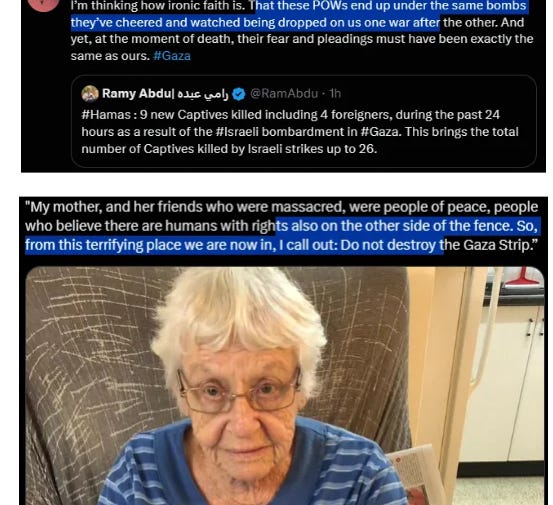
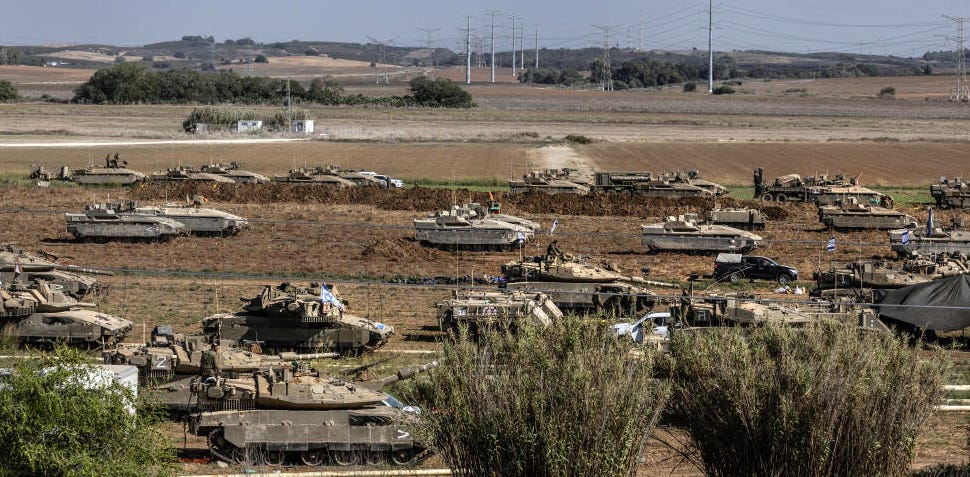
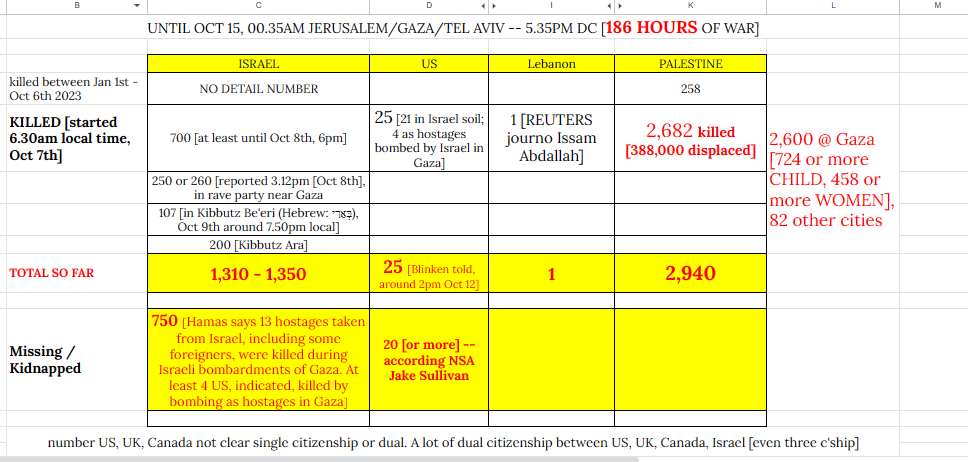
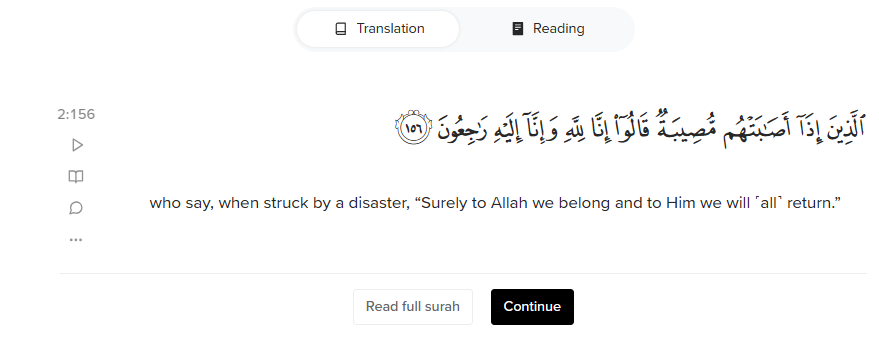
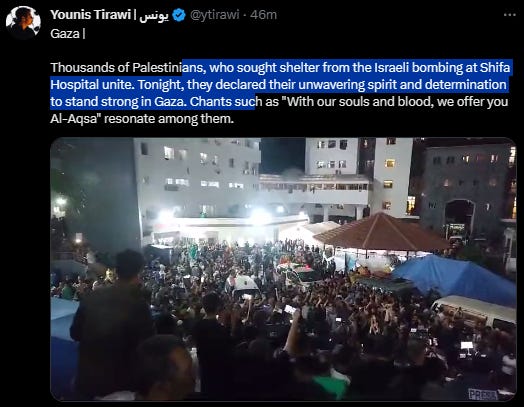
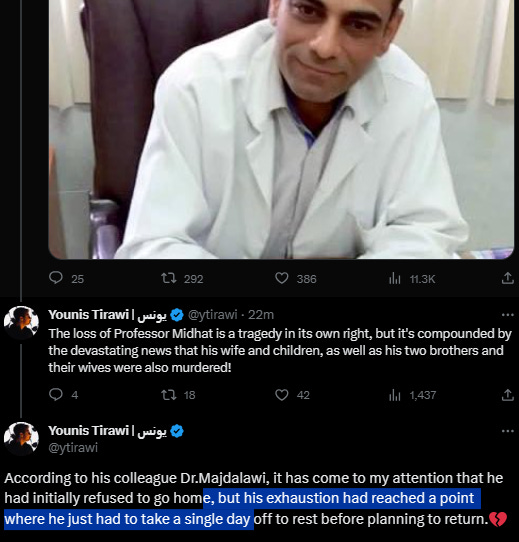
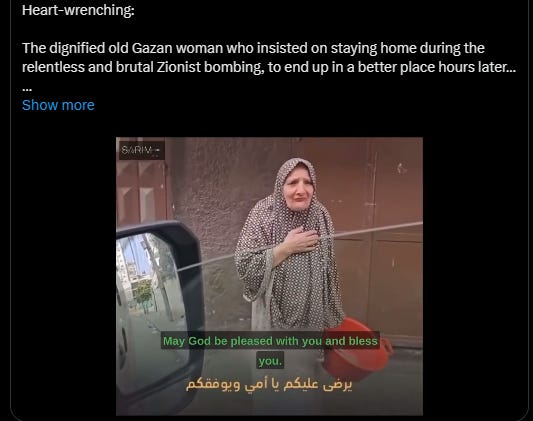
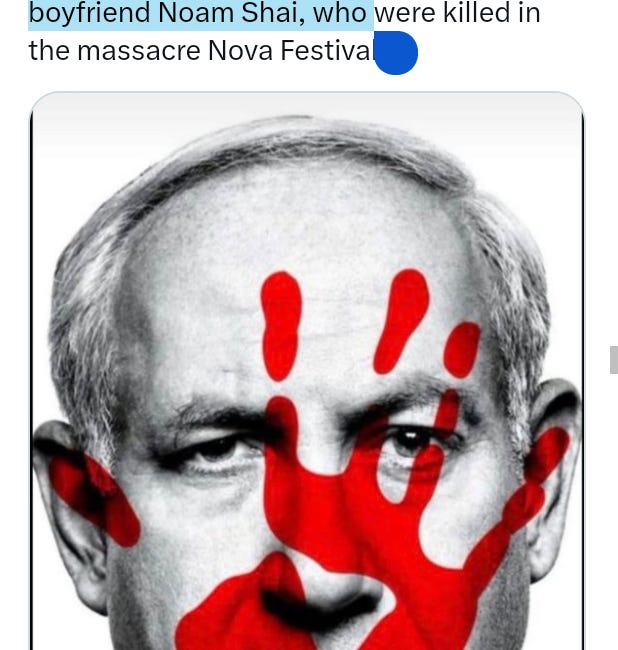
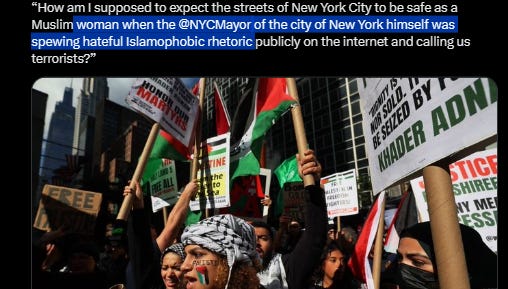
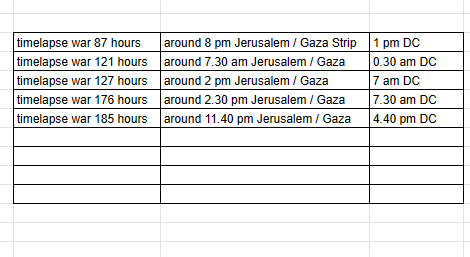
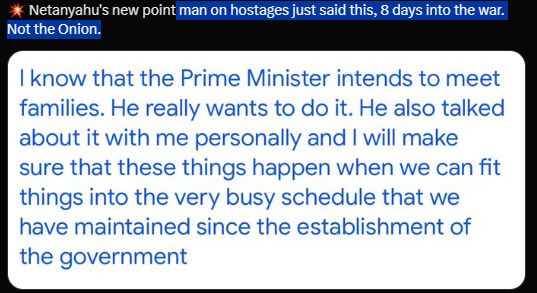
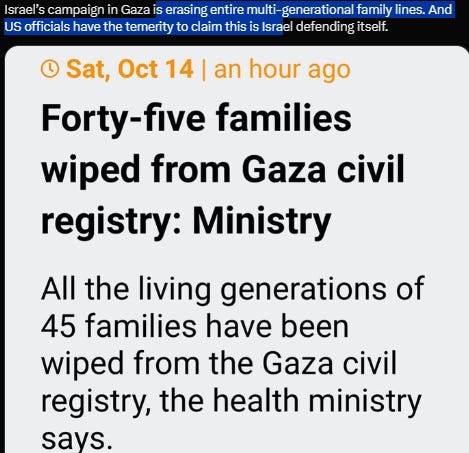
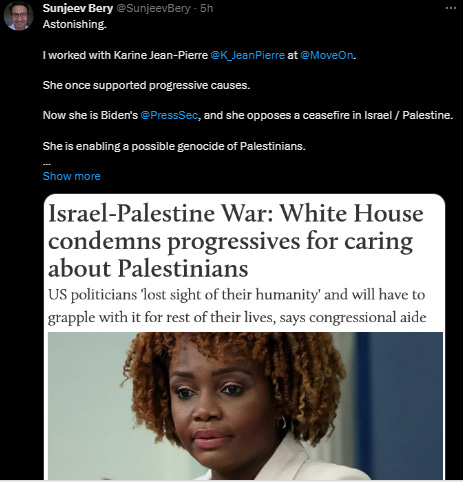
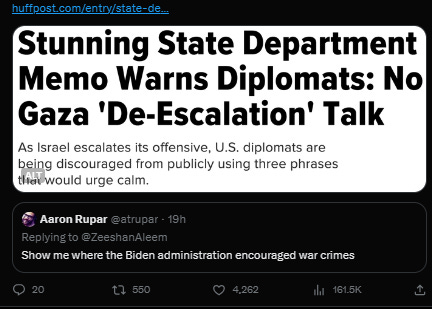
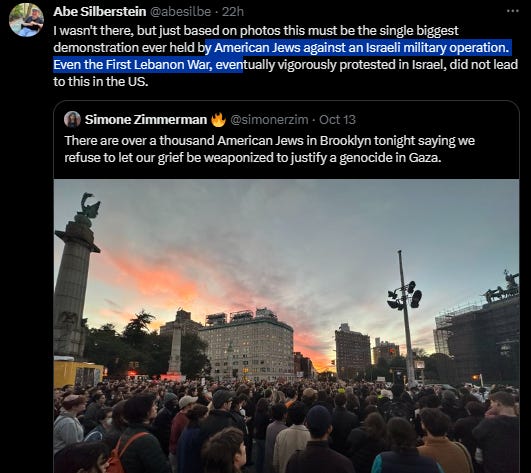
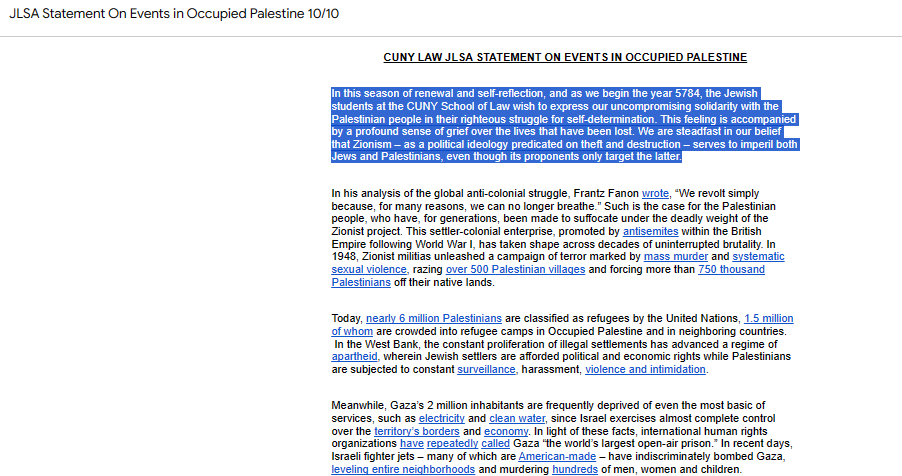
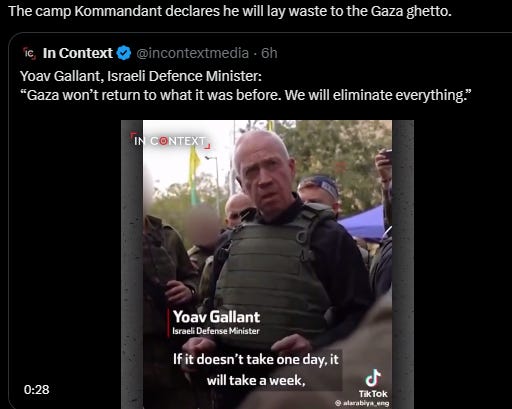
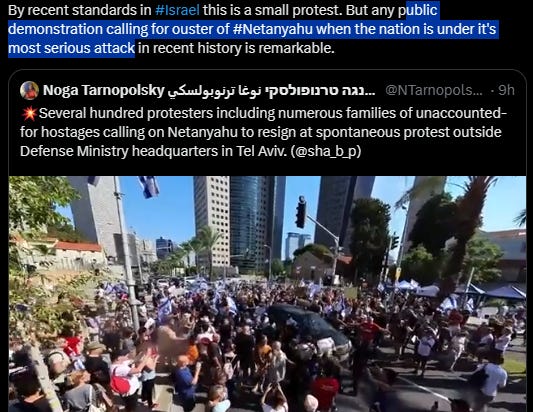
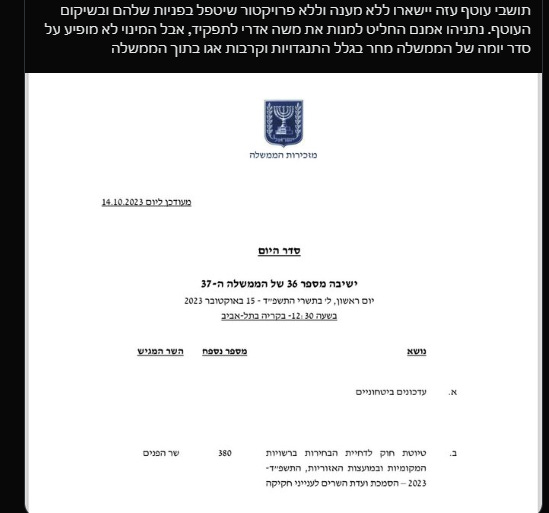
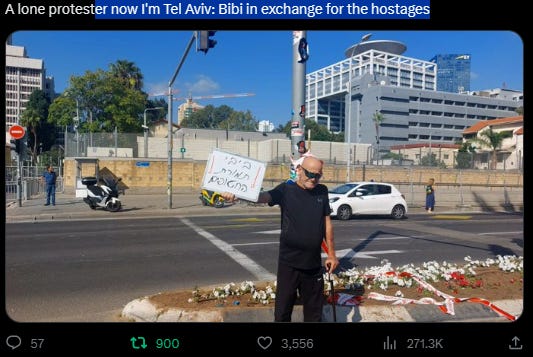
![Global Superstar Rating & Clout "killed" by Board Editorial [ps: Mehdi finally speak up, but Ayman and Ali not yet]](https://substackcdn.com/image/fetch/w_1300,h_650,c_fill,f_auto,q_auto:good,fl_progressive:steep,g_auto/https%3A%2F%2Fsubstack-post-media.s3.amazonaws.com%2Fpublic%2Fimages%2F840ba66d-fda9-45be-b579-7aa25543b475_720x556.png)
![Breaking via UN: After killing - bombing 1,600 by skies, now Israel starts killing by ground [operation]](https://substackcdn.com/image/fetch/w_1300,h_650,c_fill,f_auto,q_auto:good,fl_progressive:steep,g_auto/https%3A%2F%2Fsubstack-post-media.s3.amazonaws.com%2Fpublic%2Fimages%2F381eb852-8a16-41bc-a224-46ceabc004b5_720x1280.png)
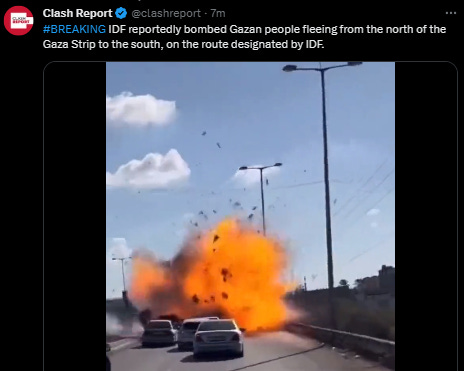
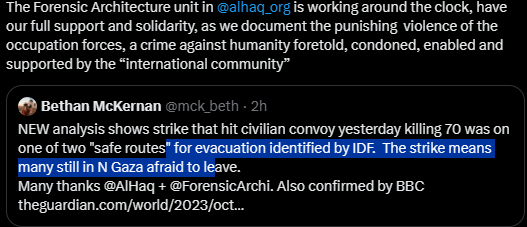
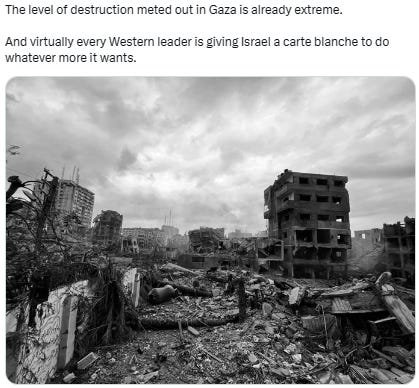
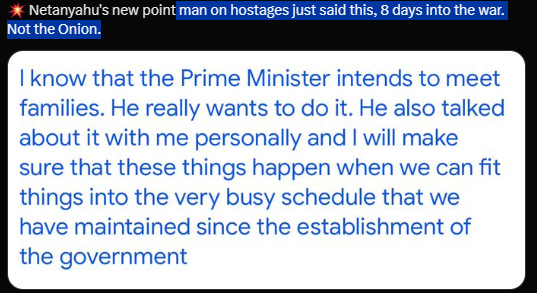
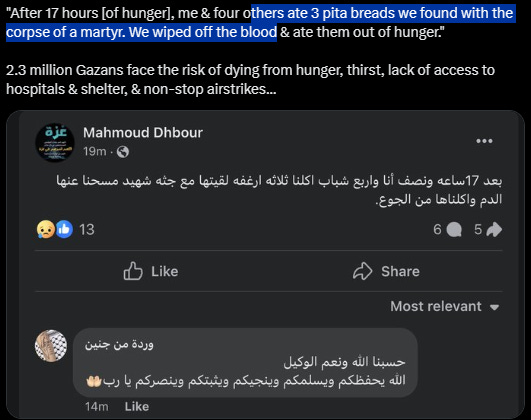
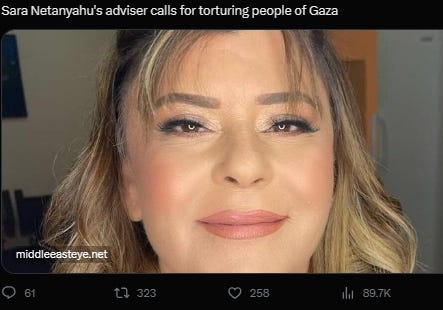
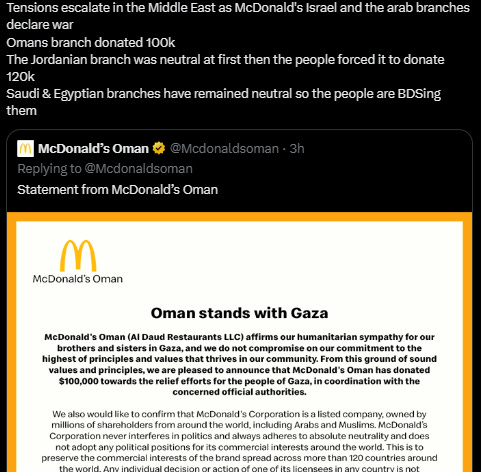
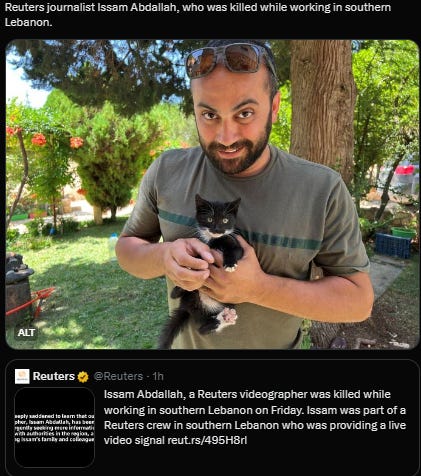
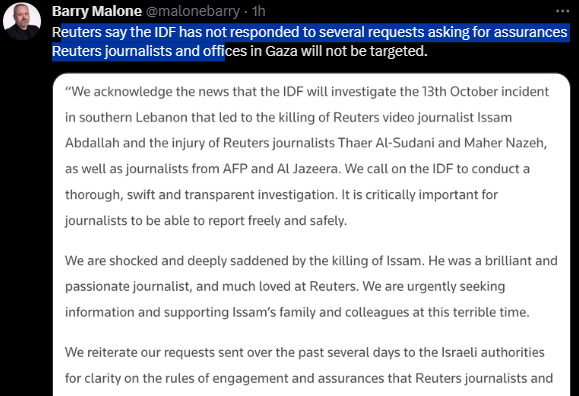
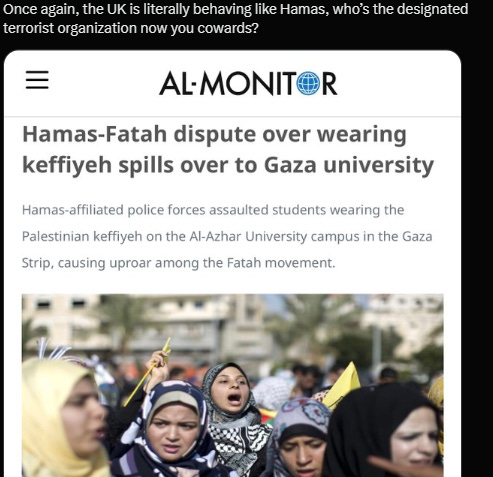
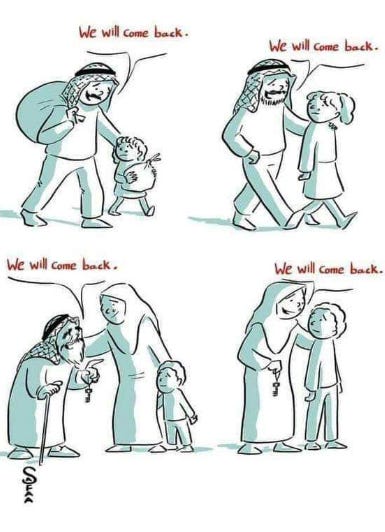
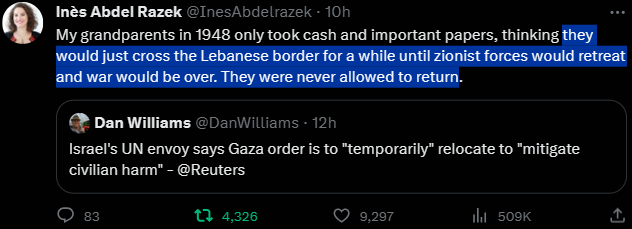
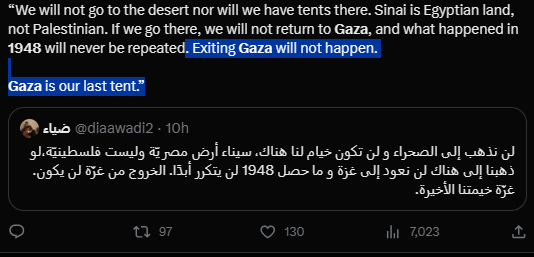
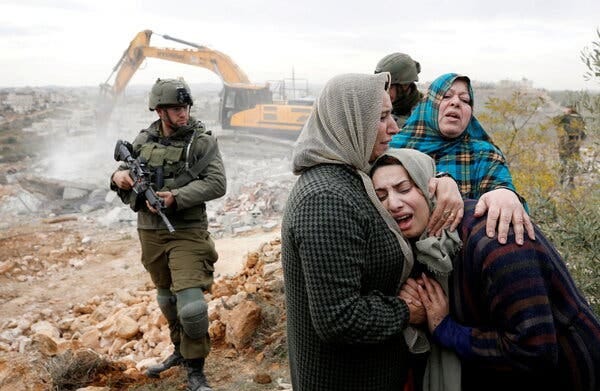
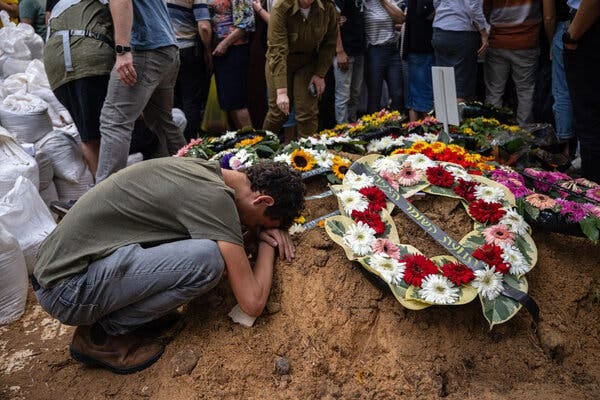
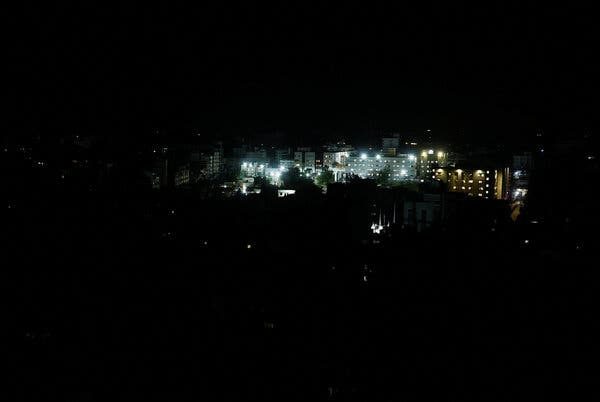
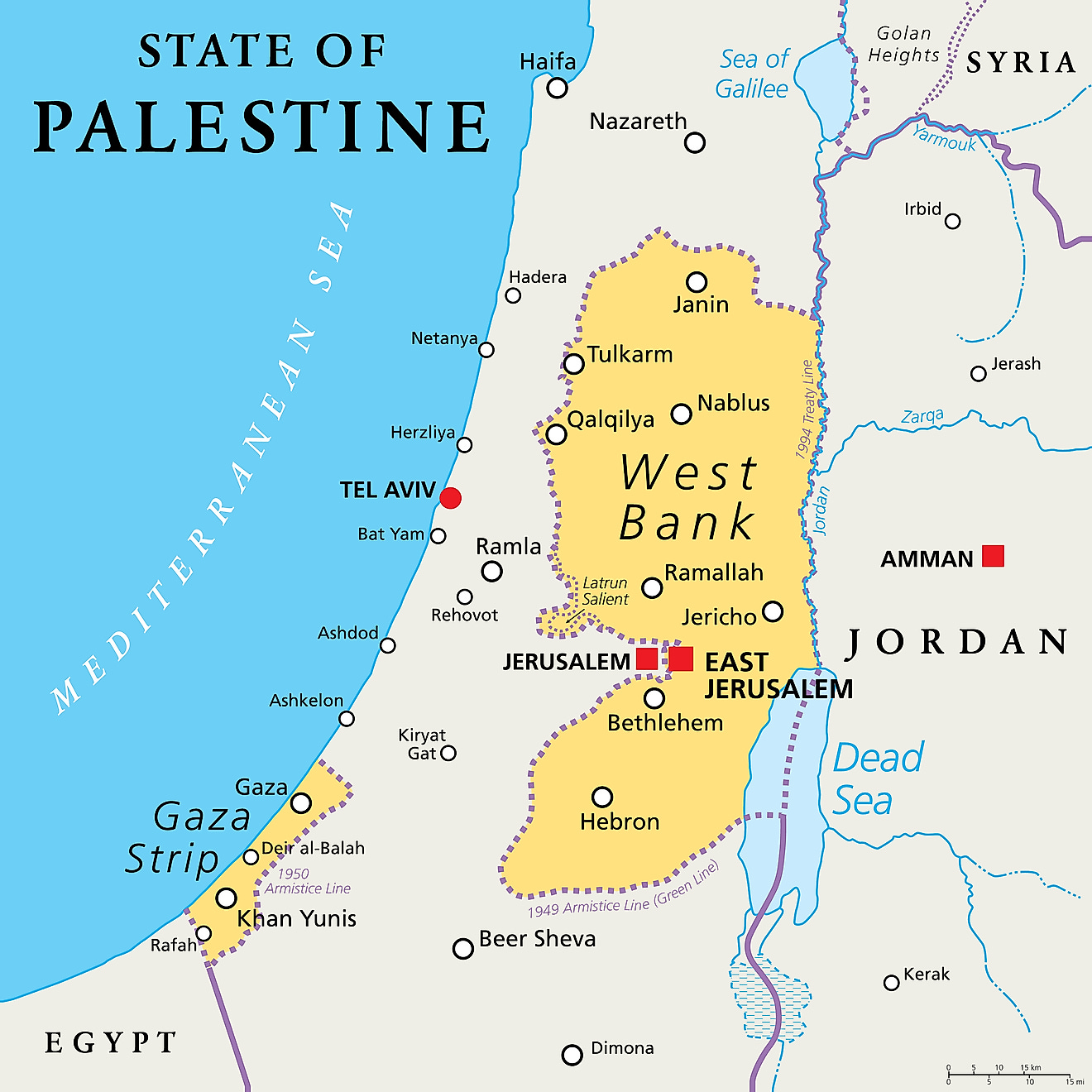
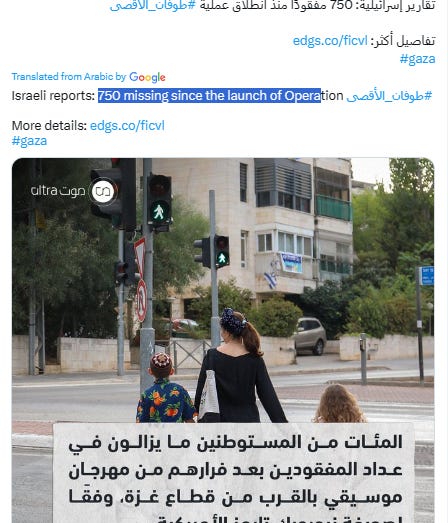
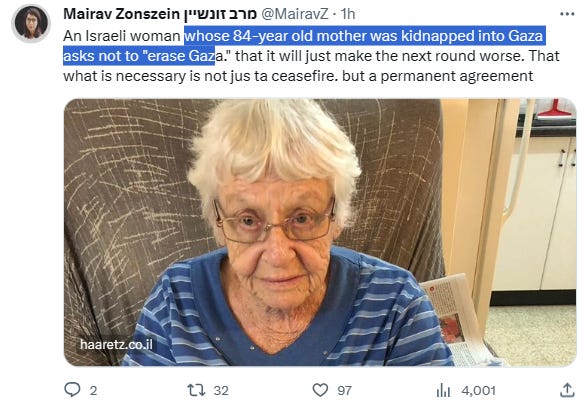
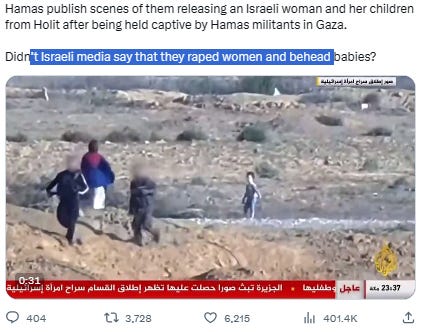
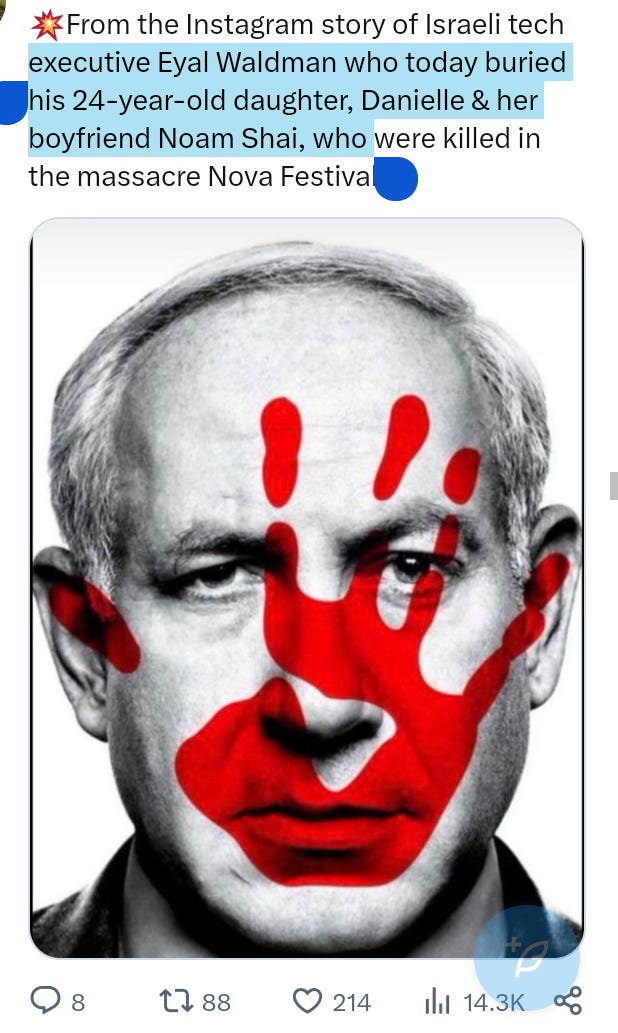
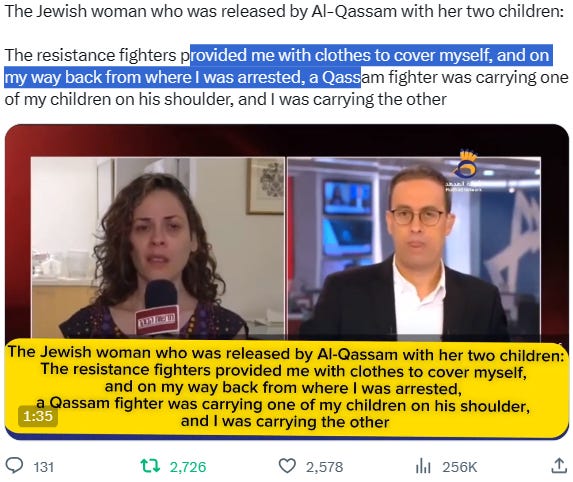
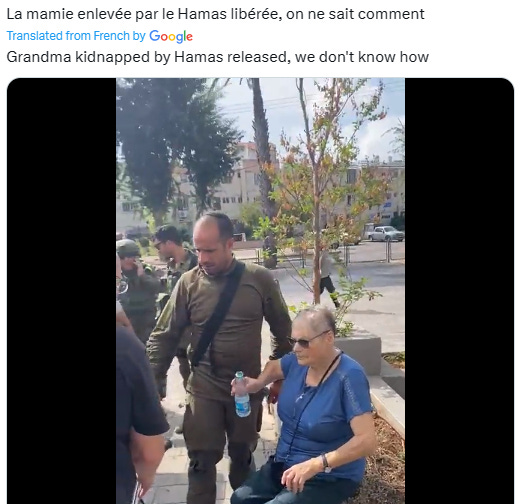
![End of [long-term peace] New Middle East End of [long-term peace] New Middle East](https://substackcdn.com/image/fetch/w_1456,c_limit,f_auto,q_auto:good,fl_progressive:steep/https%3A%2F%2Fsubstack-post-media.s3.amazonaws.com%2Fpublic%2Fimages%2F1a65e552-7889-45ef-8234-b10e8f29e34c_720x1280.png)
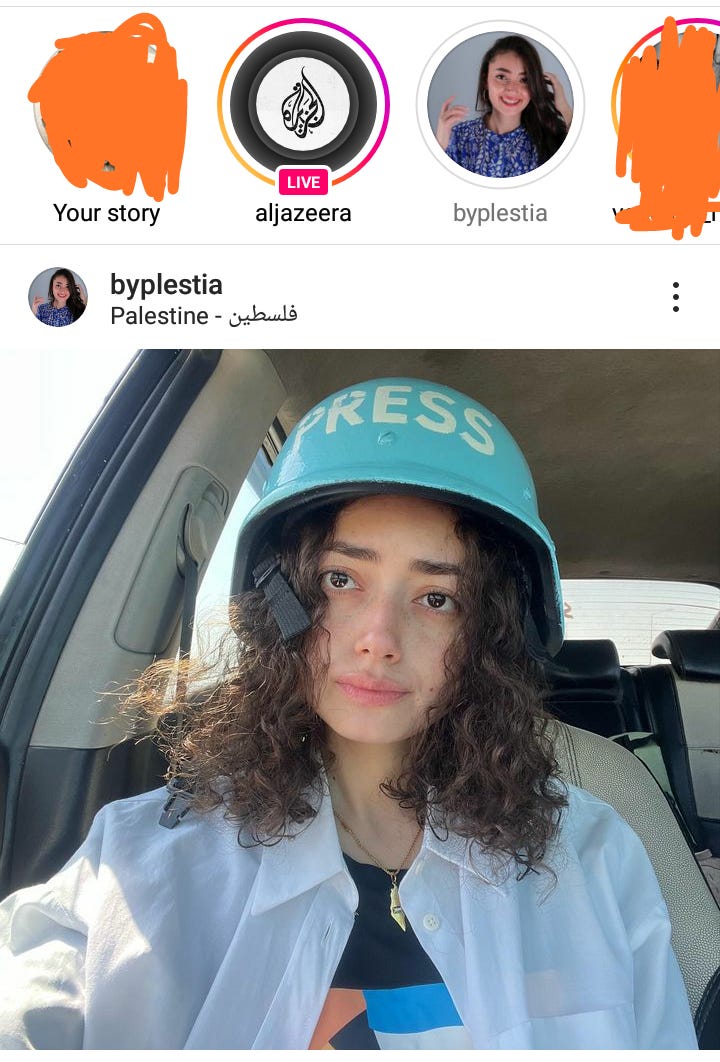

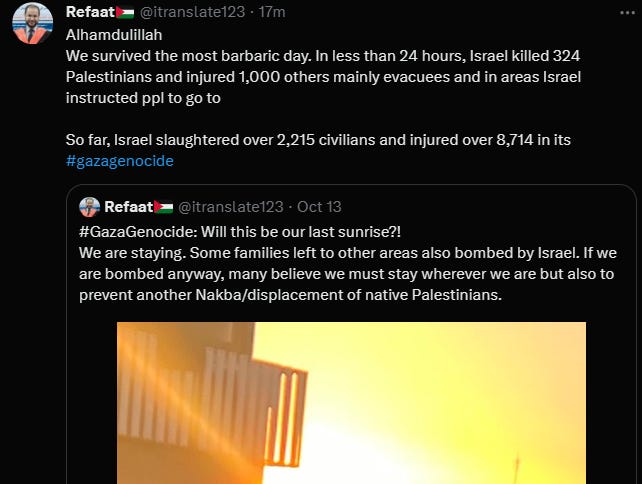
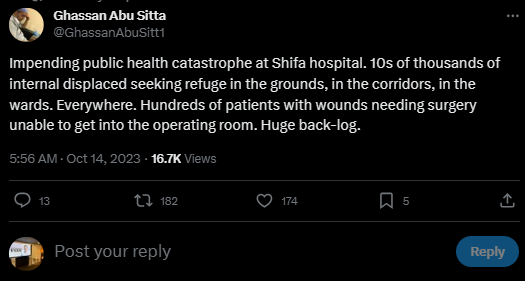
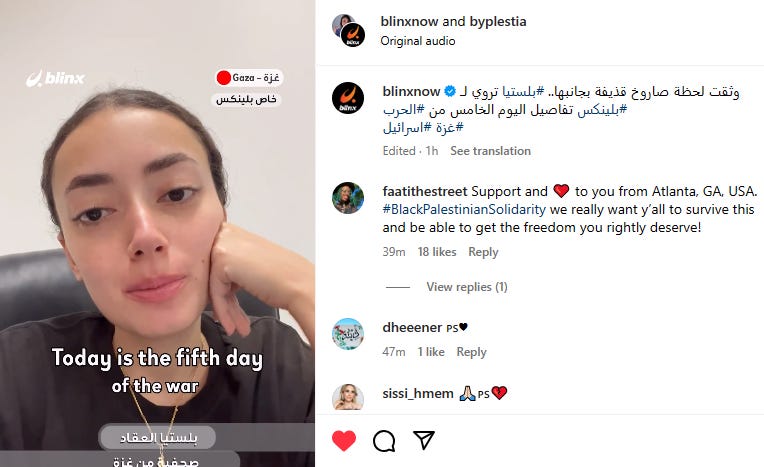
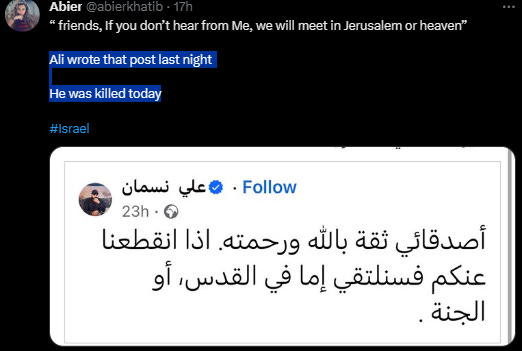


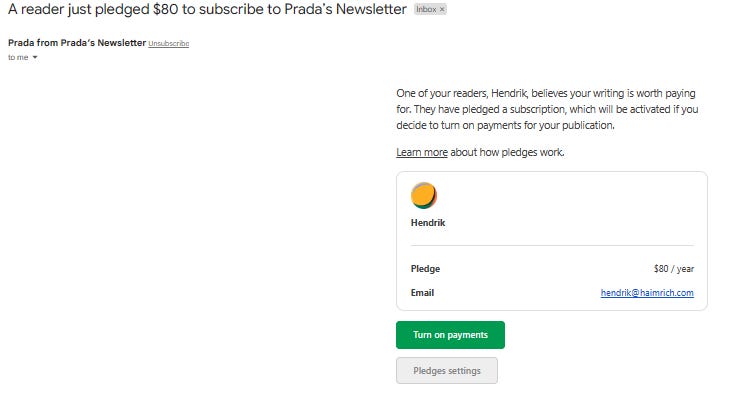




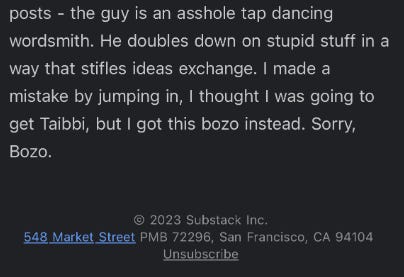




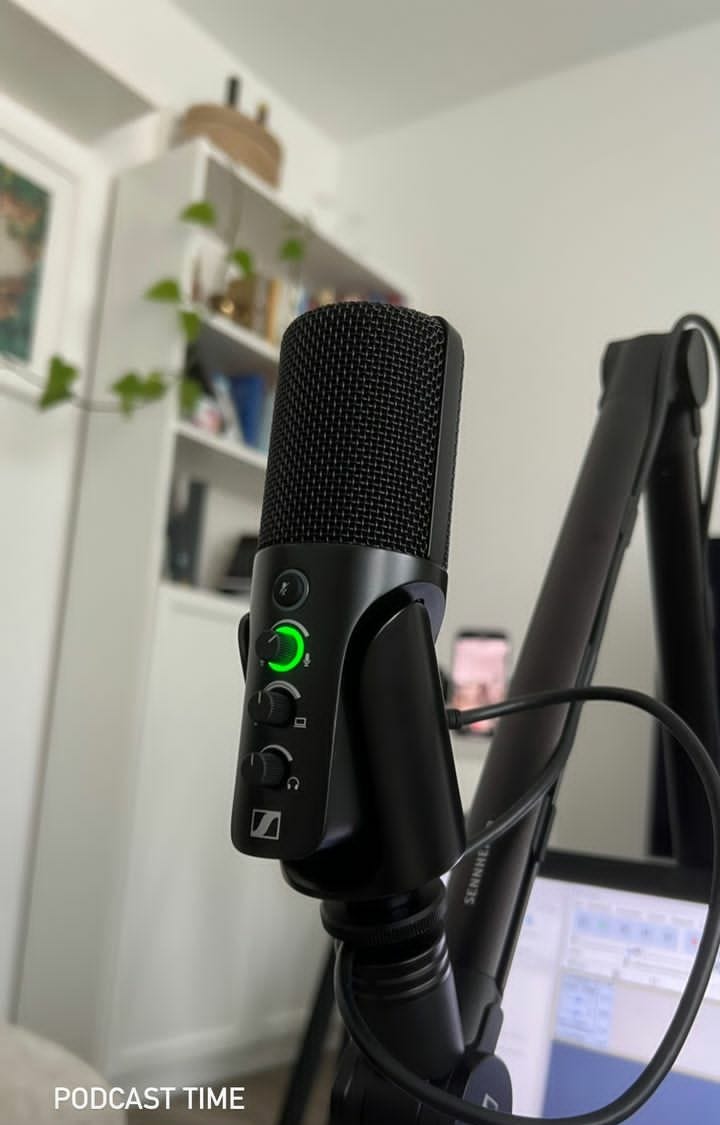
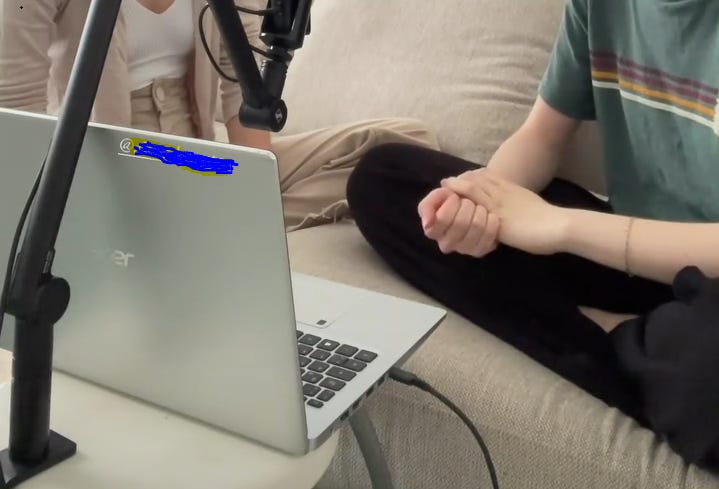




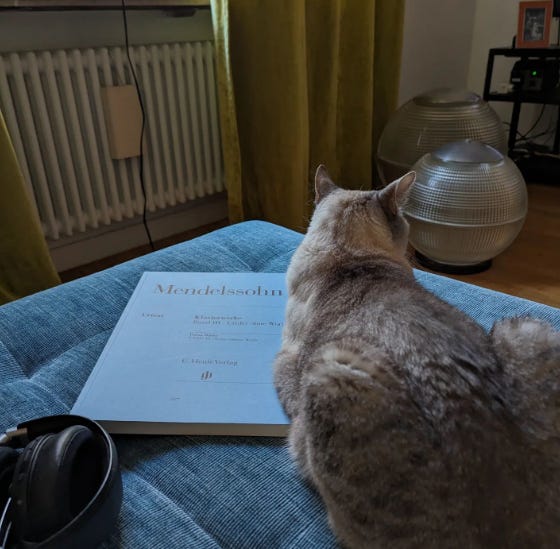

Nakba describes the failure of Five Arab Armies to exterminate the Jews in Israel.